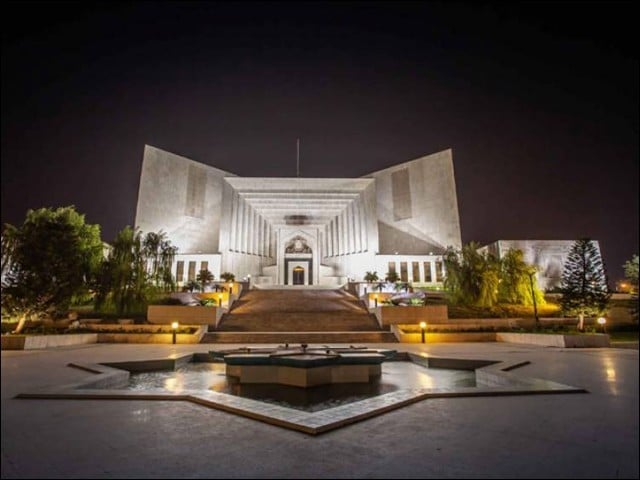The rise of a larger but weaker judiciary?
Experts weigh in on the induction of new judges to the SC at this critical juncture

Although Chief Justice of Pakistan (CJ) Yahya Afridi is excited about the induction of seven new judges to the Supreme Court, some legal experts consider such appointments as "court packing" to reduce the impact of independent judges in the apex court.
They are also questioning the timing of these appointments as a Constitutional Bench (CB) is hearing the applications for the constitution of a full court to hear petitions filed against the 26th Constitutional Amendment. Four SC judges have already raised their voice on the timing of these appointments.
Extraordinary arrangements are being made for the oath taking ceremony of six permanent judges today (Friday). It is learnt that more than 500 people are expected to attend the oath taking ceremony. CJ Afridi will administer the oath to these judges.
Doctor Yasser Kureshi, who recently wrote a book on judicial politics in Pakistan, said a government-dominated Judicial Commission of Pakistan (JCP) is "packing" the Supreme Court with new judges, with the goal of diluting the proportion of judges opposed to the 26th amendment.
"This also now means that the government will have a bigger pool of pro-government judges from which to select the judges for the CBs for important cases related to the government's interests.
Kureshi stated that the government can be more confident that, for now, the judges seeking to push back against the amendment are outnumbered and sidelined. And the government will not have to worry about judicial scrutiny of its actions.
"We have seen such actions taken by authoritarian leaders in other countries like Hungary, Poland and Turkey in the past, and Pakistan today is following a similar script," he said.
Former federal minister Fawad Chaudhry, who is also an advocate of the Supreme Court said appointment of 43 judges, including seven Supreme Court judges, in less than 100 days raises eyebrows.
"Typically, court packing occurs after a Provisional Constitutional Order (PCO), but this time, it is happening without an Official PCO. This maneuver is as controversial as judicial appointments under martial law, and these judges are seen as facilitators of authoritarianism," he added.
Abdul Moiz Jaferii Advocate said we are seeing the predicted after effects of the 26th amendment playing out, with courts across the country being packed by politicians without reasons afforded.
"Now it is the Supreme Court's turn where many of the right judges are being elevated to for the wrong reasonsnot to afford them the highest judicial office of the land but to deprive them of their administrative and senior positions in their respective high courts.
"No reasons are afforded. No criteria are transparently laid out. Meanwhile the chief justice is assuring money lenders (IMF) that all is well," Jaferii added.
He also said this capture is not sustainable. It would not have been possible had there not been abettors from within. The bars have been sold out. The media has been brought to heels. The politicians meekly sign the dotted line of their own future death warrants.
"Lenin is quoted as saying that there are decades in which nothing happens and there are weeks in which decades happen. We are seeing weeks where decades worth of damage is being done to a system already burdened by decades of stagnation," Jaferii said.
Former additional attorney general Tariq Mahmood Khokhar, who has command over Pakistan judicial history, said that the diminution of judicial independence, both at the institutional and individual levels, is evident through the 26th Constitutional Amendment.
This represents a corrupt use of "constitutional" and "legal" means to achieve court packing, he said.
"The 26th Constitutional Amendment is sub judice, yet the executive's agenda continues unchecked. A manufactured majority in the JCP has turned it into a tool of the government," he said.
Khokhar said many perceive this as judicial capitulation. The constitutional fundamentals, including the separation of powers, have been rendered obsolete. Independent and impartial observers now expect a pliant judiciary in cases involving executive interests or power.
"The state of the judiciary is dire: it is increasingly less independent, less competent, and offers less impartial justice," he adds.
Hafiz Ehsaan Ahmad Advocate, however, defended the increase of the numbers of judges in the SC.
"The new judges have been appointed to the SC in view of the recent 26th Constitutional Amendment under two different Articles of the Constitution. "Four chief justices of different high courts are simultaneously also elevated to the SC which is also unprecedented."
He also said there are further chances that more judges will be brought in the SC under both provisions of Article 177 of the Constitution as still no judges from Punjab have been elevated.
According to the constitutional expert, the persistent differences among the top judiciary will not end but further increase until the issue of 26th Constitutional Amendment is not settled.
"Now it is the responsibility of the chief justice and other judges of the Supreme Court to make a viable strategy for early fixation of all fresh and old cases and to decide them in the shortest possible time so that the real fruits of such an increase of judges can trickle down to the litigants.
"It is high time that the judges of the SC should sit together and resolve their differences within the constitutional limits in their internal meetings and should not disclose their concerns in the media or through their observations in court proceedings."



















COMMENTS
Comments are moderated and generally will be posted if they are on-topic and not abusive.
For more information, please see our Comments FAQ